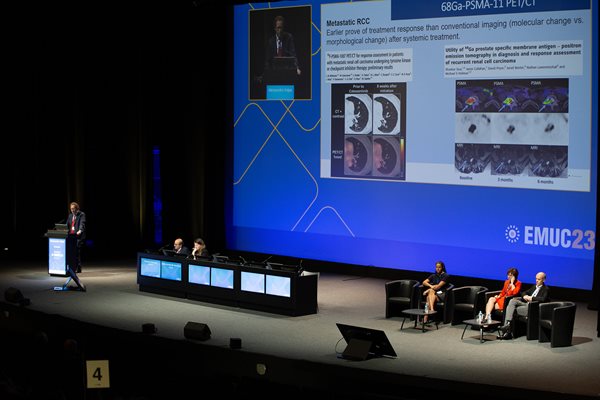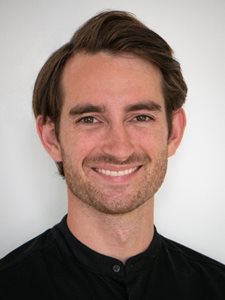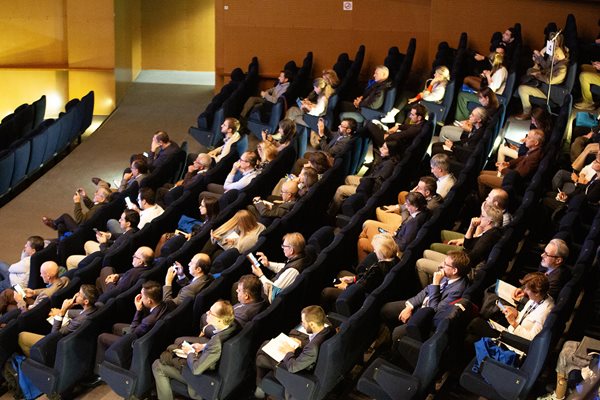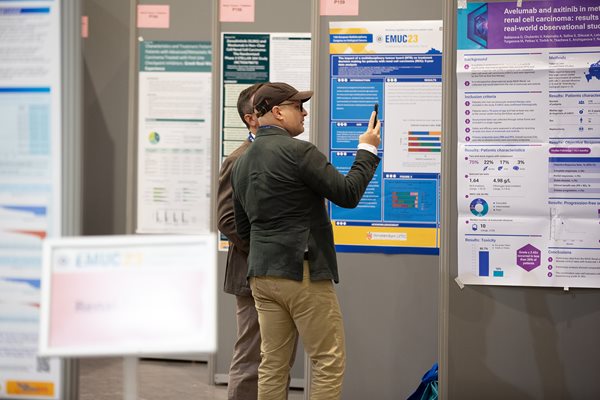15th European Multidisciplinary Congress on Urological Cancers
2-5 November 2023, Marseille, France
The European multidisciplinary congress on urological cancers (EMUC) 2023 was a shining example, as it has been before, of how interdisciplinary medical care and research should be practised. From my point of view as a junior doctor interested in genitourinary cancers, EMUC is a great place to meet renowned experts and colleagues from urology and medical oncology and to be updated on recent developments.
I had the pleasure to attend the EMUC 2023 as a young ESTRO (yESTRO) representative and to present a research project at the joint European Association of Urology (EAU)/young European Society for Medical Oncology (yESMO)/yESTRO session. This session was packed with innovative and interesting work being done by all three societies and through working programmes. The educational and scientific work performed by EAU and the insights that were offered by yESMO into mentoring and professional development and by yESTRO into organisational culture including diversity and equity were inspiring and reflected multiple factors that our societies deal with. This session also demonstrated that we as young physicians and researchers have powerful visions, which we should follow to shape the future of our professions.
EMUC 2023 offered great multidisciplinary sessions about prostate, urothelial and kidney cancers that were presented by key opinion leaders. The special value of these meetings lies within the structure of the presentations, in which major aspects from different specialties are represented. I as a radiation oncologist was initially most interested in the imaging and radiation oncology (radonc) parts, but in the end, I found the condensed information from medical oncologists and urologists particularly interesting, since this was mostly new to me. The tumour-board-like case presentations were extremely educational and applicable to real-world clinical practice. In the end, it was possible to return to one’s institution with a lot of new information that could be implemented feasibly.

One of the highlights of this year’s congress was the "game-changing" session. This session included updates on recent advances in therapies targeted towards prostate-specific membrane antigen and trials that may change medical practice, such as EMBARK, EV-302/KEYNOTE-A39 TALAPRO-2 and PROpel. Within 1.5 hours you could embrace the findings of relevant clinical trials that had been published during the previous year. Dr Stephen Freedland (USA) presented the results of the EMBARK trial, a multicentre phase III trial that involved 1068 patients who had high-risk biochemical recurrence of prostate cancer after primary treatment. Approximately 75% of the patients had undergone radiotherapy (24% radiotherapy alone, 50% prostatectomy and radiotherapy). The trial showed that patients who received enzalutamide plus leuprolide experienced superior metastasis-free-survival than those who received leuprolide alone. Although the trial did not address the role of radiotherapy in this setting, it added a new treatment tool for these patients.
Dr Powels presented results of the EV-302/KEYNOTE-A39 trial, one of the highlights of this year’s ESMO congress. This trial investigated treatment with enfortumab vedotin plus pembrolizumab versus the gold standard chemotherapy in patients with previously untreated locally advanced and/or metastatic urothelial carcinoma. Whereas previous trials of chemotherapy with inhibitors of programmed cell death protein or ligand 1 failed to show a survival benefit for these patients, V-302/KEYNOTE-A39 showed significant and clinically meaningful improvements in progression-free-survival and overall survival rates, marking a milestone for this patient population.
The new "networking and abstract discussion session" was a perfect way to get in touch with fellow researchers across Europe, and the chats could be continued during evening events in which Marseille showed great value even as it had to deal with the indirect effects of storm Ciaran.
As a representative of yESTRO on the scientific committee of EMUC 2024, I wish to see more radoncs attending the congress, which will be in Lisbon. It is a great opportunity for genitourinary cancer enthusiasts to broaden their horizons, present their research, meet old and new friends and learn the latest treatment updates. If you are interested in EMUC and have any questions, please don’t hesitate to contact me via email or social media.
Save the date: 7-10 November 2024, Lisbon!

Simon Spohn
Department of Radiation Oncology
University Medical Centre Freiburg
Freiburg, Germany
simon.spohn@uniklinik-freiburg.de
X: @Simon_Spohn
LinkedIn: Simon Spohn

